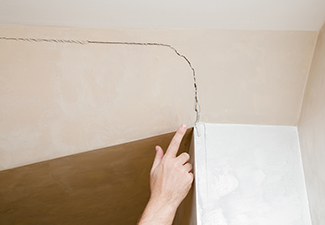What Can I Do About House Defects After a Sale?
Feb. 16, 2022
 You have just purchased and moved into your dream home, and the first rain comes. Suddenly, that pristine-looking ceiling in the bedroom is leaking water onto your hardwood floor. This is certainly not something you bargained for, and you may wonder what your options are.
You have just purchased and moved into your dream home, and the first rain comes. Suddenly, that pristine-looking ceiling in the bedroom is leaking water onto your hardwood floor. This is certainly not something you bargained for, and you may wonder what your options are.
California has laws regarding the construction of homes and the liabilities of the builders, but there are also laws for sellers to reveal material defects before closing the deal. If you purchased a new home, then SB 800, or the Right to Repair Law, will provide protection as long as ten years after purchase. If you purchased an existing home, you have legal remedies depending on whether the defect was revealed to you before or was covered under a warranty, implied, or written.
If your new dream home is suddenly presenting you with nightmare scenarios, contact J. Eric LeVine, ESQ. From my office in Laguna Hills, I proudly serve clients everywhere in Southern California, including the counties of Orange, Los Angeles, San Bernardino, Riverside, and San Diego. I will consult with you, assess your situation and help you seek the remedy you need.
Common Issues with Residential Property
A savvy or deceitful homeowner may well have replastered the ceiling of your new bedroom, only to have the rain reveal the hidden problem, as discussed above; however, other issues often surface when a home is purchased. In addition to poor roofing, your home may have underlying issues, including:
Hidden water damage
Bad sewer lines or rusted pipes
Poor or old ventilation or windows
Outdated wiring
Electrical, plumbing, and HVAC issues
Septic tank issues
Carbon monoxide leaks
California Civil Code Section 1102 requires that sellers and their agents provide potential buyers with a real estate disclosure statement. The California Department of Real Estate (DRE) provides a uniform Transfer Disclosure Statement (TDS) form that contains sections for sellers and their agents to fill out. The seller’s section is a list of potential defects with checkboxes next to them. The agent’s section allows the broker to confirm the seller’s information or add more detail.
The TDS is not required under certain circumstances, such as when the sale is part of a subdivision project requiring the buyer to be provided with a public report. Foreclosures, court-ordered transfers, and transfers between joint owners are also exempt.
Who’s Responsible?
If material problems are not revealed on a TDS in an agent-brokered transaction, various parties could be liable. For instance, a seller who deliberately withholds information about a defect may be liable, as could the agent if that person helped cover up the defect. So also might be a home inspector who missed the defect while verifying the condition of the home. However, a home inspector may be liable only for the cost of the inspection, not for repairs.
SB 800, the Right to Repair Law
Senate Bill 800, commonly referred to as SB 800 or the Right to Repair Law, has made builders liable for correcting defects in newly constructed homes. Builders can opt-out of SB 800, so if you wish to pursue a defect claim, you must first check if the builder is honoring SB 800. The law requires that you give the builder the right to correct the defect before taking legal action.
The act itself lists 45 functionality standards; a violation of anyone can result in an actionable claim. The standards are divided into seven categories: (one) water intrusion issues, (two) structural issues, (three) soil issues, (four) fire protection issues, (five) plumbing and sewer issues, (six) electrical system issues, and (seven) a catch-all category regarding other areas of construction.
Liability extends for up to ten years depending on the category represented. For instance, plumbing, sewer, and electrical defects are covered up to four years after purchase.
Proving Liability
Legal action can generally be brought not only under SB 800 for new construction but new and existing residential homes based on strict liability, negligence, fraud and misrepresentation, breach of contract, and breach of warranty. California construction laws do carry strict liability standards. Builders are expected to honor a duty of care to complete jobs in a “workmanlike” manner of professional tradesmen.
For a successful claim, a few factors must pertain. First, the defect must have existed before your purchase and wasn’t something you could easily have noticed, and is not the result of normal wear and tear associated with living in a home. Second, the defect must not have been disclosed to you, and you relied on the available information, whether on a TDS or otherwise.
Beware, however, to read the fine print when you purchase a home. Sellers in California often use an “as is” clause in the terms of the sale, which means you accept all defects and conditions of the home when you buy it.
What Can Be Done?
The first step is to contact the seller and seek to remedy the problem through negotiations or agreement. If this doesn’t work, you can suggest mediation with a third party. Huddling with an attorney, you can also create and present the seller with a demand letter, basically setting forth what remedy you expect to be forthcoming.
The final step is a lawsuit, but lawsuits can be lengthy and expensive. It might be cheaper to do the repairs yourself or rely on your homeowners’ insurance and then seek remuneration in a small claims court. Seek legal counsel in whatever you do.
How Legal Counsel Can Help
Defects in homes are covered by several California statutes, but using the right strategy to hold the builder, seller, or agent accountable is essential. It’s always advisable to seek the counsel of an experienced real estate attorney to map out your approach and to help conduct negotiations for you.
If you’re in Laguna Hills, California, or the counties of Orange, Los Angeles, San Bernardino, Riverside, and San Diego, contact me immediately at J. Eric LeVine, ESQ., for a free consultation.
